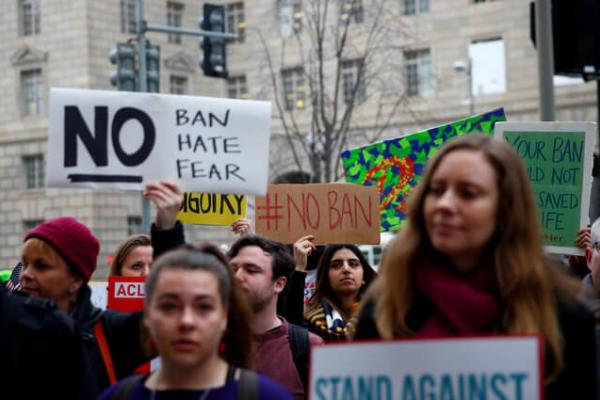A U.S. federal judge in Virginia ruled on March 24 that President Donald Trump's travel ban was justified, increasing the likelihood the measure will go before the Supreme Court, as the decision took an opposing view to courts in Maryland and Hawaii that have halted the order.
U.S. District Court Judge Anthony Trenga rejected arguments by Muslim plaintiffs, who claimed Trump's March 6 executive order temporarily banning the entry of all refugees and travelers from six Muslim-majority countries was discriminatory.
The decision went against two previous court rulings that put an emergency halt to the order before it was set to take effect on March 16. The order remains halted.
Trump has said he plans to appeal those unfavorable rulings to the U.S. Supreme Court if needed, and differing opinions by lower courts give more grounds for the highest court to take up the case.
Trenga, an appointee of Republican President George W. Bush, said the complaint backed by the Council on American-Islamic Relations (CAIR), a Muslim civil rights group, found that more than 20 individuals who brought the suit had been able to show they were harmed by the travel ban, since they might be unable to reunite with their relatives.
But he also ruled that Trump's revised order, which replaced a more sweeping version signed on Jan. 27 and rejected by courts, fell within the president's authority to make decisions about immigration.
He said that since the order did not mention religion, the court could not look behind it at Trump's statements about a "Muslim ban" to determine what was in the "drafter's heart of hearts."
Trump has said the ban is necessary to protect the country from terrorist attacks, but his first order was halted by a federal judge in Seattle and a U.S. appeals court in San Francisco, due to concerns it violated the U.S. Constitution's prohibition against religious bias.
The Justice Department praised the Virginia decision, saying in a statement, "As the court correctly explains, the president's executive order falls well within his authority to safeguard the nation's security." CAIR said it would appeal the decision to the 4th U.S. Circuit Court of Appeals.
A ruling by U.S. District Judge Derrick Watson in Hawaii — an appointee of Democratic President Barack Obama — put a stop to the two central sections of the revised ban that blocked travelers from six countries and refugees, while leaving other parts of the order in place.
U.S. District Judge Theodore Chuang in Maryland, also an Obama appointee, only put a halt to the section on travelers.
The Virginia lawsuit sought to strike down the revised ban in its entirety.
Watson scheduled a hearing for March 22 to decide whether his temporary order, blocking the travel and refugee restrictions, should be converted into a more formal preliminary injunction. The Justice Department has said it would oppose that bid.
The government has appealed Chuang's decision in Maryland, also to the 4th circuit, and a hearing in that case is scheduled for May 8. The Hawaii case was brought by state attorneys' general opposed to the ban, and the Maryland case was filed by refugee advocacy groups.
Other lawsuits against the ban continue to move forward around the country. Also on March 24, the Southern Poverty Law Center and other groups filed a new complaint in U.S. District Court in Washington D.C., on behalf of Muslim community organizations.
(Reporting by Mica Rosenberg in New York; Additional reporting from Dan Levine in San Francisco; Editing by Cynthia Osterman)
Got something to say about what you're reading? We value your feedback!
